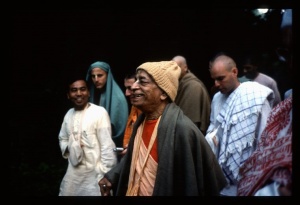SB 4.20.29

A.C. Bhaktivedanta Swami Prabhupada
TEXT 29
- bhajanty atha tvām ata eva sādhavo
- vyudasta-māyā-guṇa-vibhramodayam
- bhavat-padānusmaraṇād ṛte satāṁ
- nimittam anyad bhagavan na vidmahe
SYNONYMS
bhajanti — they worship; atha — therefore; tvām — You; ataḥ eva — therefore; sādhavaḥ — all saintly persons; vyudasta — who dispel; māyā-guṇa — the modes of material nature; vibhrama — misconceptions; udayam — produced; bhavat — Your; pada — lotus feet; anusmaraṇāt — constantly remembering; ṛte — except; satām — of great saintly persons; nimittam — reason; anyat — other; bhagavan — O Supreme Personality of Godhead; na — not; vidmahe — I can understand.
TRANSLATION
Great saintly persons who are always liberated take to Your devotional service because only by devotional service can one be relieved from the illusions of material existence. O my Lord, there is no reason for the liberated souls to take shelter at Your lotus feet except that such souls are constantly thinking of Your feet.
PURPORT
The karmīs are generally engaged in fruitive activities for material bodily comforts. The jñānīs, however, are disgusted with searching after material comforts. They understand that they have nothing to do with this material world, being spirit souls. After self-realization, the jñānīs who are actually mature in their knowledge must surrender unto the lotus feet of the Lord, as stated in Bhagavad-gītā (bahūnāṁ janmanām ante (BG 7.19)). Self-realization is not complete unless one comes to the devotional platform. Therefore it is stated in the Śrīmad-Bhāgavatam that those who are ātmārāma, self-satisfied, are freed from all contaminations of the material modes of nature. As long as one is affected by the modes of material nature, especially by rajas and tamas, he will be very greedy and lusty and will therefore engage in hard tasks, laboring all day and night. Such false egoism carries one from one species of life into another perpetually, and there is no rest in any species of life. The jñānī understands this fact and therefore ceases to work and takes to karma-sannyāsa.
Yet this is not actually the platform of satisfaction. After self-realization, the material wisdom of the jñānī leads him to the shelter of the lotus feet of the Lord. Then he is satisfied only in contemplating the lotus feet of the Lord constantly. Pṛthu Mahārāja therefore concluded that liberated persons taking to the devotional path have acquired the ultimate goal of life. If liberation were the end in itself, there would be no question of a liberated person's taking to devotional service. In other words, the transcendental bliss derived from self-realization, known as ātmānanda, is very insignificant in the presence of the bliss derived from devotional service to the lotus feet of the Lord. Pṛthu Mahārāja therefore concluded that he would simply hear of the glories of the Lord constantly and thus engage his mind upon the lotus feet of the Lord. That is the highest perfection of life.